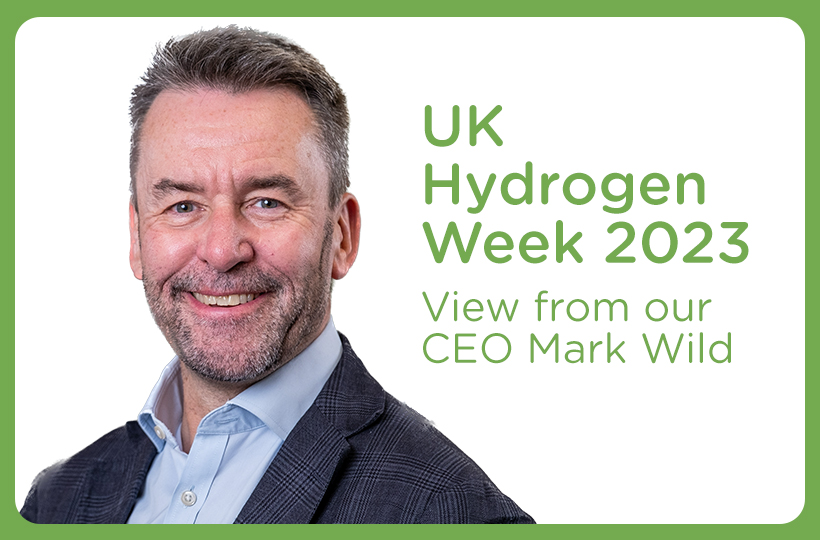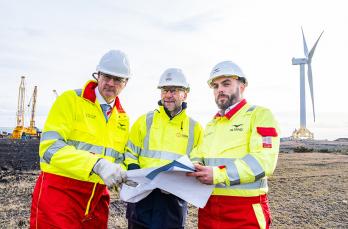
The UK’s first official Hydrogen Week is here, with the aim of explaining the role of hydrogen in reaching net zero.
There are developments across the entire UK economy and the campaign intends to bring together all regions of the UK to cement the nation’s role as a world leader in hydrogen and capitalise on the huge opportunity the sector offers for both reducing carbon emissions and driving green economic growth.
The focus comes at a crucial time. The cost-of-living crisis is rightly at the forefront of everyone’s minds and is the biggest policy challenge facing the country today. The UK government has acted to support customers, but the underlying issues underline the urgency of the need to act to protect consumers and deliver a secure supply of energy.
While some may think now is the time to rethink our net zero commitments, we need to be doubling down on them. Net zero and energy security go hand in hand with one another and green technologies can play a leading role in reducing our dependence on global energy markets to bring down bills.
Our vision
We are taking a strategic approach to decarbonisation to develop pioneering clean energy projects to help shape the UK's future.
Our vision is to lead the way in low-carbon energy delivery by making gas green. We strongly believe that decarbonising the gas networks, predominantly through the adoption of hydrogen in place of natural gas, can play a vital role in helping meet the UK net-zero targets.
While I don’t see hydrogen as a silver bullet to decarbonise home heating, I do think the scale and complexity of the challenge is so big that we’re going to need every tool in the box to achieve it – that means hydrogen, biomethane, heat networks and electrification.
We must develop a whole system understanding of the impact of these technologies, while being clear on the potential cost of different pathways to consumers.
As the UK and Scottish Governments have acknowledged, hydrogen will have a role in decarbonising the power and industrial sectors and ensure we maintain security of supply and capture the economic benefits that net zero offers.
Essential projects
The power stations that take supply from the gas network will play an essential role in maintaining security of supply, balancing nuclear and renewables. And with industrial load located not just in key clusters but across our entire network, we must find a way to distribute hydrogen efficiently to enable this. Which is why projects such as LTS Futures are essential.
On the coldest day of this winter so far, SGN supplied the gas equivalent of 11GW of power to our customers in Scotland. In whatever form it comes, a huge transformation needs to take place to decarbonise that gas and at SGN we are sure hydrogen will be part of that.
It is essential that the whole system cost to consumers of different pathways for decarbonising residential heating is understood by policymakers, regulators and the industry.
We need solutions which work with customers and the challenges they face in managing their household budgets.
We must also look at the next great challenge of net zero on a whole system basis and understand how we design and build infrastructure that optimises the resources we have across multiple sectors.
We’ll be giving this a lot of thought in 2023 and expect it to be central to our approach in the future.
Helping the transition
In the UK, we have an opportunity to scale up the production of indigenous hydrogen, working alongside electricity, to help deliver a resilient system that decarbonises a number of sectors.
Offering a similar customer proposition to natural gas, we are exploring whether the pipes we manage could be repurposed to take on hydrogen in the future.
At the domestic level, our world-first H100 Fife project will soon deliver green hydrogen to homes in Levenmouth, Fife. And this year will see us reach several key milestones with our project, including construction work getting under way and our demonstration facility going live.
It will play a central role in providing the evidence required for upcoming policy decisions on hydrogen for heat.
We’re also in the final stages of putting proposals together for town pilots for up to 10,000 customers, which we see as the start of a nationwide rollout of decarbonisation through hydrogen.
Backed by investors, customers and policymakers across the UK, the hydrogen industry is making great progress, and opportunities to go further are plentiful.




